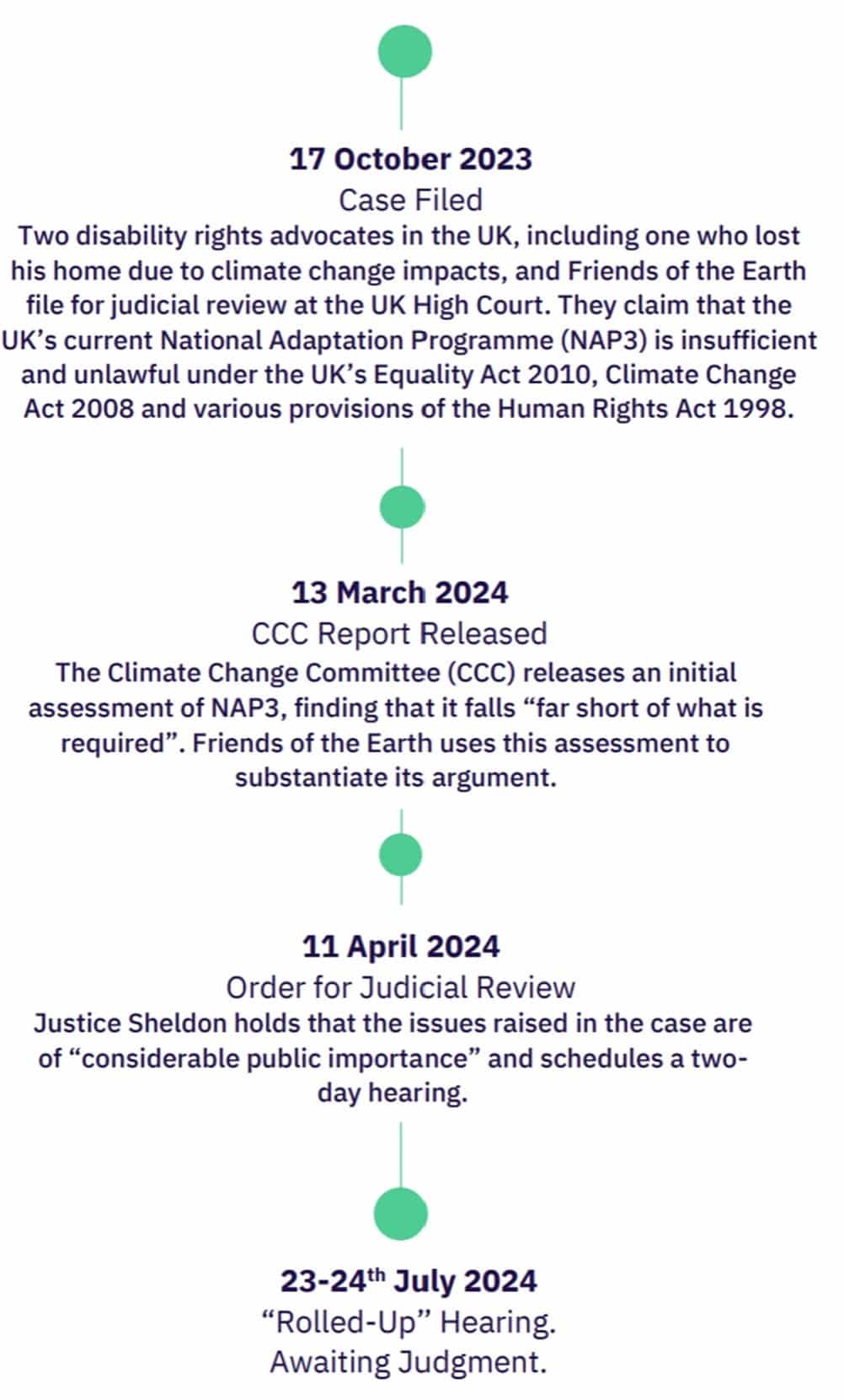
In this case:
The Plaintiffs include two disability rights advocates in the UK, who are at increased risk of serious harm from the impacts of climate change in the UK. They are joined by the NGO Friends of the Earth.
They bring a legal challenge against the United Kingdom’s Third National Adaptation Programme (NAP3), which the Government published in July 2023. This is the first case to focus on the UK’s adaptation strategy, which the Plaintiffs argue is often overlooked yet already has particularly significant implications for marginalised populations.
The challenge includes a claim that the Government failed to assess the unequal impact of NAP3 on protected groups in society, including persons with disability. The Plaintiffs also focus on legal compliance with the Climate Change Act 2008 and provisions under the Human Rights Act 1998.
In bringing this case, the Plaintiffs aim to strengthen NAP3 and uphold human rights in climate policymaking.

(1) Individuals, victims, associations and standing
In this case, the two co-plaintiffs and Friends of the Earth (FoE) sought judicial review[1] of the Secretary State’s decision to publish the UK Government’s 3rd five-year National Adaptation Programme (NAP3) for parliamentary consideration. The first co-plaintiff is Doug Paulley, an environmentalist and disability rights activist whose series of conditions (nervous system impairment, diabetes and heart condition) places him at increased risk of serious harm from climate change impacts such as overheating in seasonal heatwaves. He is joined by Kevin Jordan, also a disability rights advocate, who lost his home to demolition after coastal erosion – fueled by sea level rise and severe storms – put the house at severe danger of falling into the sea.
Responding to pre-judicial complaints, the Secretary of State denied any wrongdoing.
At the initial hearing in the UK High Court, Justice Sheldon found that the issues raised by the plaintiffs are of “considerable public importance” and therefore permitted the judicial review to go forward.
(2) Public sector equality duty
In an unprecedented move so far in UK climate litigation, the Plaintiffs argue that the Government unlawfully failed to discharge its duty under the UK Equality Act 2010 by not considering the unequal impacts of NAP3 on protected groups in society, including persons with disabilities. The Courts have previously disputed any duty of the Government to give “differential consideration to the interests of those who may be affected” (Plan B v SoS for BEIS [2018] EWHC 1892 [51]). However, since Friends of the Earth v SoS for BEIS (the BEIS case), UK courts require an Equality Impact Assessment to be conducted for compliance under the Equality Act ([2022] EWHC 1841 [27]). This case may provide greater clarity on the scope and impact of such assessments.
(3) Human Rights claims
The UK Human Rights Act (HRA) 1998 incorporates the rights contained in the European Convention of Human Rights (ECHR) into UK domestic law, including an individual’s right to life, a private and family life, the prohibition of discrimination, and the protection of property. The Plaintiffs here claim that the Secretary of State’s decision to publish NAP3 amounts to a breach of the HRA, which makes it unlawful for a public authority to act in a way which is incompatible with these rights. The Plaintiffs claim points to the Government’s failure to prepare healthcare settings to adapt to excessive heat; their lack of support for communities at imminent risk of homelessness due to climate change; and gaps and inconsistencies in the allocation of funding. They also argue that there is no evidence to suggest that the Government conducted any reasonable analysis to strike a fair balance between safeguarding the human rights of vulnerable people and the interests of wider society.
A similar rights-based approach has been taken in four other UK climate-related cases so far. These arguments have been largely unsuccessful, deemed misplaced or otherwise demanding more than the permissible incremental development of the climate jurisprudence in the courts. At most, these Courts recognized that governmental responses to environmental protection should generally engage human rights (Plan B v SoS of BEIS [2019]). Still, government authorities are afforded a large degree of discretion in determining such responses (Plan B v The Prime Minister [2021] EWHC 3496 [50)].
This case should be watched closely to see if the adaptation context encourages a more stringent judicial approach to rights protection.
(4) Climate Change Act claims
Under the Climate Change Act
(CCA), the Secretary of State is required to set out adaptation “objectives”, as well as the proposals, policies and timescales required to meet those objectives. Further, it is now legally necessary that the Secretary of State consider and/or publish information on the risks to delivery of the government’s climate mitigation plans (The BEIS Case [2022] EWHC 1841 [204]).
The Plaintiffs in this case argue that the “risk reduction goals” in the NAP3 are so vague that they fail to comply with the CCA. They also argue that there is no evidence that any risk assessment was conducted.
These CCA claims are likely the strongest grounds of review in this case: the successful BEIS case concerned the same claims of insufficient climate planning, but in the context of climate mitigation. Further, although the CCC reports are not legally binding, the Court in the BEIS case placed “considerable weight” on the CCC’s views when determining the standards for sufficient climate planning (The BEIS Case [2022] EWHC [215]). This means that the CCC’s assessment may be particularly useful to the Plaintiffs. Again, it will be interesting to see if, and how, the Courts approach in the mitigation context translates to issues of adaptation.
Climate change litigation implications
This case falls under C2LI scenario 1: it is a case in which civil society is challenging a governments’ climate action or response on human rights grounds. The case will potentially be significant for three key reasons.
Firstly, this case marks the first time a UK court will determine the lawfulness of the Government’s climate adaptation policy, including potential human rights breaches. Similar arguments regarding the need for specific, tailored climate planning under the UK Climate Change Act have already been successful with regards to climate mitigation. Indeed, Friends of the Earth themselves have won two landmark cases in the High Court, challenging the Government’s insufficiently evidenced Net Zero Strategy (The BEIS Case [2022] EWHC 1841) and the Carbon Budget Delivery Plan (Friends of the Earth v Secretary of State for DESNZ [2024] EWHC 995). If the adaptation-focussed arguments in this case are successful, the Plaintiffs would help create the legal foundation required to ensure well-informed, inclusive and accountable climate planning from the UK Government.
Secondly, the case is significant for drawing attention to the specific and multiple vulnerabilities experienced by persons with disabilities and/or impairments in the face of climate change. So far, persons living with disabilities have only featured in climate cases focussed on a broader category of “vulnerable populations”, or disability is presented as a secondary characteristic in cases focussed on a large subcategory of a vulnerable population. For example, the case builds on the Swiss KlimaSeniorinnen litigation, where a group of elderly women – some with health conditions or impairments – successfully argued that the Swiss Government’s failure to adopt a practical and effective response to climate change violated their human rights ([2024] ECHR 304, 53600/20). However, KlimaSeniorinnen did not explicitly refer to specific rights or protections for persons with disabilities. As such, this case is significant for its focus on two individuals living with different health conditions and impairments. Challenging the NAP3 based on the Government’s specific obligation to consider the impacts of any climate adaptation programme on persons with disability through an Equality Impact Assessment and human rights considerations further highlights the significance of this case. If successful, this case could be a watershed moment for protected groups engaging with the Equality Act 2010 and the HRA in the climate context.
Thirdly, the case is politically significant. NAP3 was drawn up by the former Conservative Government. However, its implementation is the responsibility of the new Labour Government, who came into power just before the hearing in July 2024. The new Government has so far decided to defend the current NAP3. As such, this case may renew public attention to holding the new Government accountable for their pre-election pledges to improve the UK’s resilience to climate change, if not result in a legal obligation to urgently draw up a tougher programme. Both outcomes are likely to inform future litigation efforts.
[1] Judicial review is a type of court proceeding that enables individuals and civil society to challenge the lawfulness of an exercise of power by governmental authorities.

